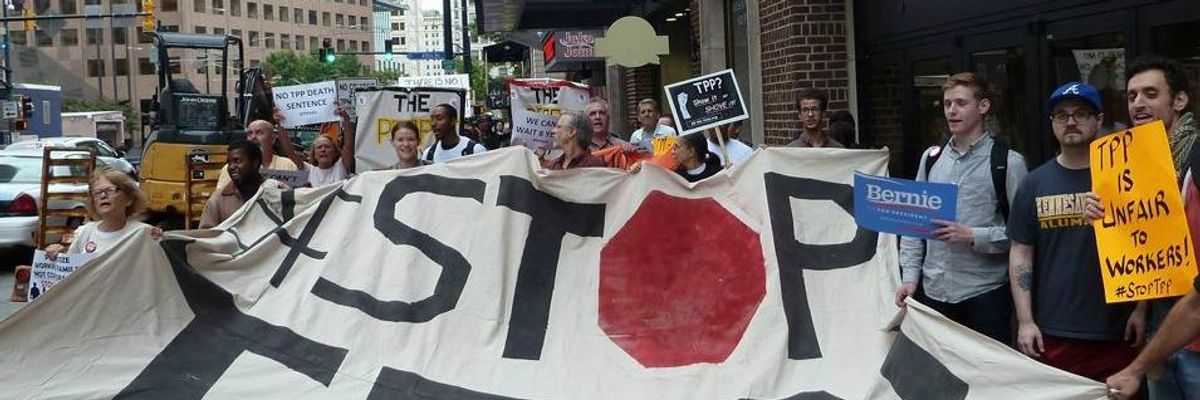If there really is a Trans-Pacific Partnership (TPP) deal, its fate in Congress is highly uncertain given the narrow margin by which trade authority passed this summer, the concessions made to get a deal, and growing congressional and public concerns about the TPP's threats to jobs, wages, safe food and affordable medicines and more. The intense national battle over trade authority was just a preview of the massive opposition the TPP will face given that Democratic and GOP members of Congress and the public soon will be able to see the specific TPP terms that threaten their interests.
With congressional opposition to TPP growing and the Obama administration basically up against elections cycles in various countries, this ministerial was extended repeatedly because this was the do or die time but it's unclear if there really is a deal or this is kabuki theatre intended to create a sense of inevitability so as to insulate the TPP from growing opposition.
Ten U.S. presidential candidates have pushed anti-TPP messages in their campaigning, stoking U.S. voters' ire about the pact. Democratic candidate Senator Bernie Sanders has repeatedly said that "The TPP must be defeated." GOP frontrunner Donald Trump also has repeatedly slammed the TPP, stating "It's a horrible deal for the United States and it should not pass." The Canadian national election outcome could also rock the TPP talks, as Conservative Prime Minister Harper's political opponents have taken critical views of his approach to TPP.
If there really is a deal, its fate in Congress is at best uncertain given that since the trade authority vote, the small bloc of Democrats who made the narrow margin of passage have made demands about TPP currency, drug patent and environmental terms that are likely not in the final deal, while the GOP members who switched to supporting Fast Track in the last weeks demand enforceable currency terms, stricter rules of origin for autos, auto parts and apparel, and better dairy access for U.S. producers.
The TPP's prospects will be even worse if the Administration announces a deal today but then does not actually have a final text to provide Congress. There is intense controversy in many TPP countries about the pacts' threats to jobs, affordable medicine, safe food and more.
Timing Could Be Everything
As this memo explains, under the Fast Track bill, various congressional notice and report filing requirements add up to about four and one half months between notice of a final deal and congressional votes being taken. Even if all of the timelines are fudged by the 90-day notice to Congress before signing, a TPP vote cannot occur in 2015.
The passage of TPP in Congress is anything but certain. On Sept. 25, 160 House GOP and Democrats sent a letter to Obama demanding enforceable currency disciplines in the TPP. While building that level of support required months when a similar letter was sent in 2013, this letter was in circulation for only a week, starting when the TPP Atlanta ministerial was announced. Meanwhile, at the end of the summer, 19 pro-Fast Track Democrats sent a letter laying out necessary environmental terms for an acceptable deal, and 18 pro-Fast Track Democrats sent a letter about lack of enforcement in current and future trade agreements and demanding action against Peru for violations of environmental terms in its bilateral U.S. trade deal. Twelve Democrats who supported Fast Track and 12 GOP members were among the 160 representatives signing a letter decrying Malaysia's inclusion in the TPP and the upgrade of Malaysia's human trafficking status. During this week's negotiations, the top Republican and Democrat leaders on trade in the House and Senate sent a letter expressing frustration at the lack of coordination and consultation between USTR and Congress on the remaining issues of the negotiation, and 25 pro-Fast Track Republicans and Democrats from dairy districts sent a letter expressing their concern that a final deal would not meet their goal for improved dairy market access in Canada and Japan.
Polling to Nowhere
As this memo shows, recent polling reveals broad U.S. public opposition to more-of-the-same trade deals among Independents, Republicans and Democrats. While Americans support trade, they do not support an expansion of status quo trade policies, complicating the push for the TPP. Furthermore, recent Pew polls in many of the TPP nations show that, outside Vietnam, the deal does not have strong support.

